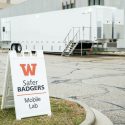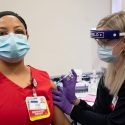First employees and students receive COVID-19 vaccine at University Health Services
This morning, University Health Services gave the very first shots of the Moderna COVID-19 vaccine to eligible employees and students at the University of Wisconsin–Madison. The vaccine is one of two in the U.S. currently authorized by the Food and Drug Administration for use during the pandemic.
“We know it could be many more months before we can vaccinate all of our students and employees, but we are so glad to get this started today,” says Patrick Kelly, a physician and interim director of medical services at UHS. “I hope this is the beginning of the end of the pandemic.”
Based on federal and state guidance, eligible individuals at UW–Madison include employees and students working directly with COVID-19 patients and those who are working directly with the virus and with virus samples.
UW–Madison will continue to provide vaccine as it is available and as federal and state decision-makers determine criteria for additional phases of vaccination.
Devlin Cole, preventive medicine resident at the UW–Madison School of Medicine and Public Health, was among those to receive vaccine on Monday. She, too, is heartened by this step, though she encourages everyone to continue to take precautions to prevent spread of COVID-19. This includes those who are vaccinated.
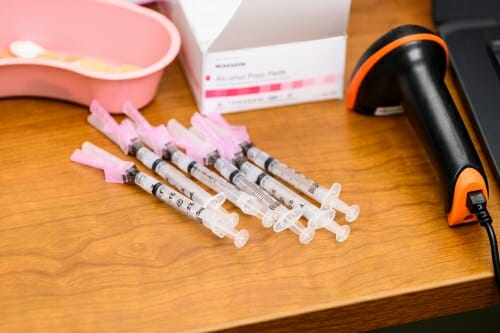
Syringes with measured doses of the Moderna COVID-19 vaccine are ready at UHS. Photo: Jeff Miller
“It will take some time before we know whether the vaccine prevents people from being carriers of the virus,” she says. “I am going to continue to wear a mask and socially distance.”
The arrival of vaccine provides a lot of hope for students and employees that campus will ultimately return to normal, says Jake Baggott, executive director of UHS and associate vice chancellor for student affairs/health and wellbeing.
Here are some of the people among the first to be vaccinated as part of the university’s vaccine distribution plan:
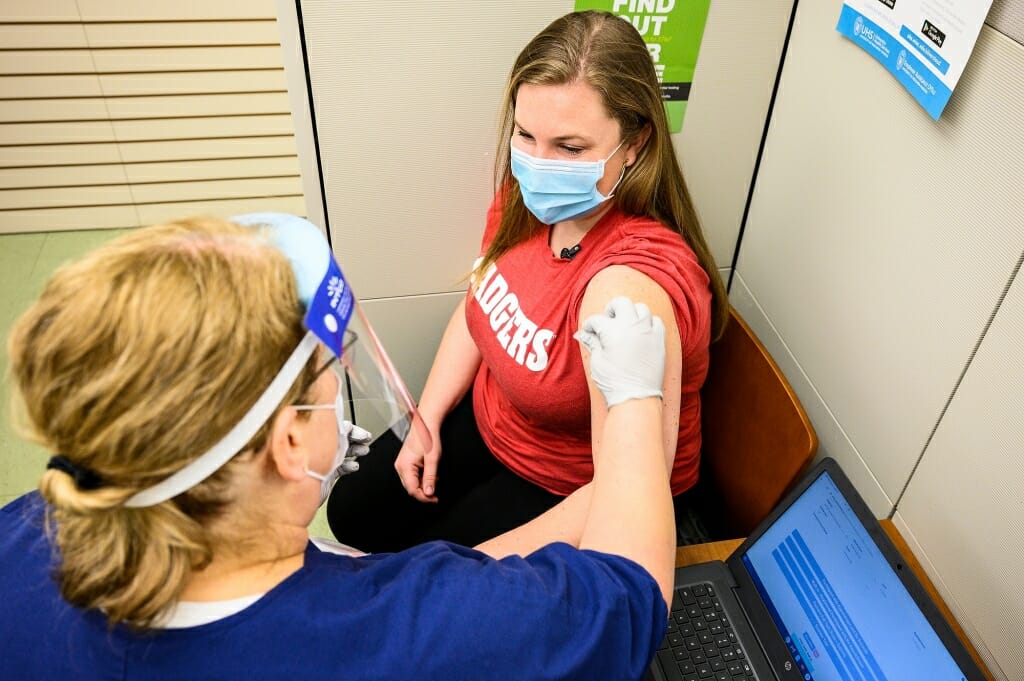
Nurse Sally Lynd, left, vaccinates Devlin Cole, a preventive medicine resident at the School of Medicine and Public Health, with the first of a two-dose shot of the Moderna COVID-19 vaccine as eligible Phase 1a recipients begin receiving coronavirus vaccinations at University Health Services. Photo: Jeff Miller
Devlin Cole, preventive medicine resident at the UW–Madison School of Medicine and Public Health
Not only was she among the first to get vaccinated at UHS, Cole has also been working closely with University Health Services on vaccine management.
“I’m so grateful to be afforded this protection as I continue to work with our university students, many of whom have had COVID-19 last semester or were in quarantine, and I’m thrilled that we are able to protect the frontline workers here at UW–Madison who are caring for those students.”
In addition to her clinical and research roles on campus, last fall Dr. Cole worked on a joint UW–Madison and Center for Disease Control and Prevention initiative to better understand COVID-19 on college campuses.
“This vaccine is a tool that we get to use as a society for a safe return to in-person connections,” she says. “I’ve had people say to me that it’s too good to be true. The vaccine was produced quickly but the science of efficacy and safety was not rushed.”
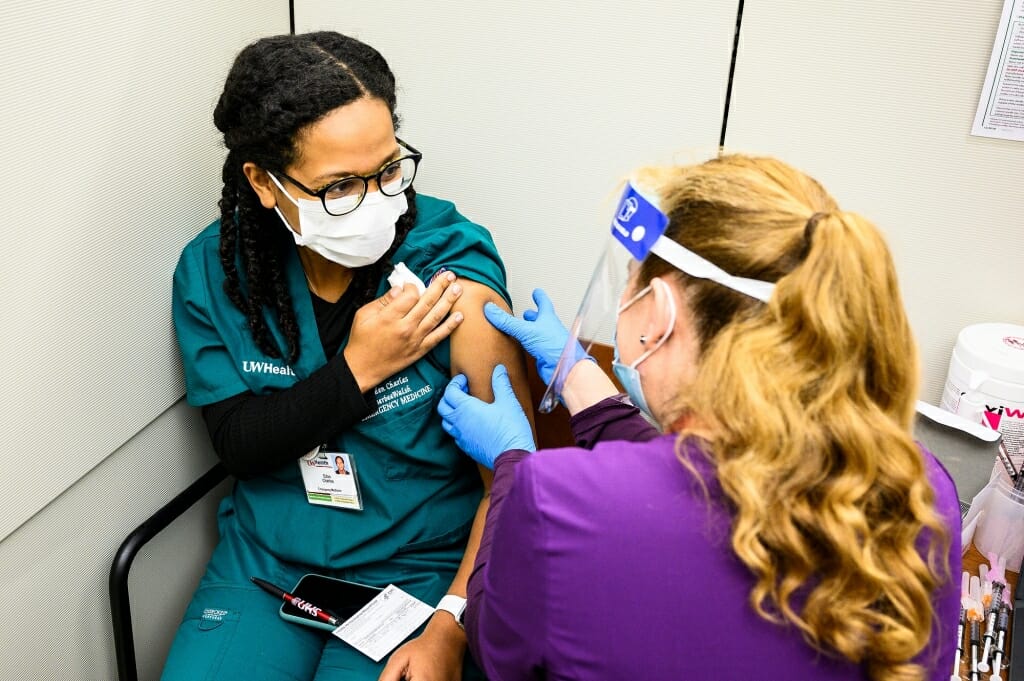
Nurse Nicole Metko, right, vaccinates Eden Charles, a researcher in the School of Medicine and Public Health Department of Emergency Medicine. Photo: Jeff Miller
Eden Charles, research coordinator in the UW–Madison School of Medicine and Public Health Department of Emergency Medicine
For the first few months of the pandemic, Charles and her research colleagues performed their duties at home, but soon, she found herself back in the hospital working with COVID-19-positive patients.
She has been involved in efforts to better understand how COVID-19 affects people and has been assisting with COVID-19 vaccine clinical trials. She is also performing nasal swabs on patients as part of a study into rapid testing.
“I talk to COVID-19 patients, so it was important to me to get vaccinated to protect myself and my family,” she says. “I thought about the community as a whole and, as a person who is able to take the vaccine when I know there are people who can’t, I wanted to do my part to keep my community safe.”
She describes being really excited and a little nervous when she learned she could get the vaccine, but “the benefits outweighed the potential side effects.”
And once she actually got the vaccine?
“I feel excited,” she says. “I am hoping this pandemic is coming to an end this year and I feel like we are getting close to that. That’s the exciting thing about today, being a part of it. The pandemic won’t be here forever.”
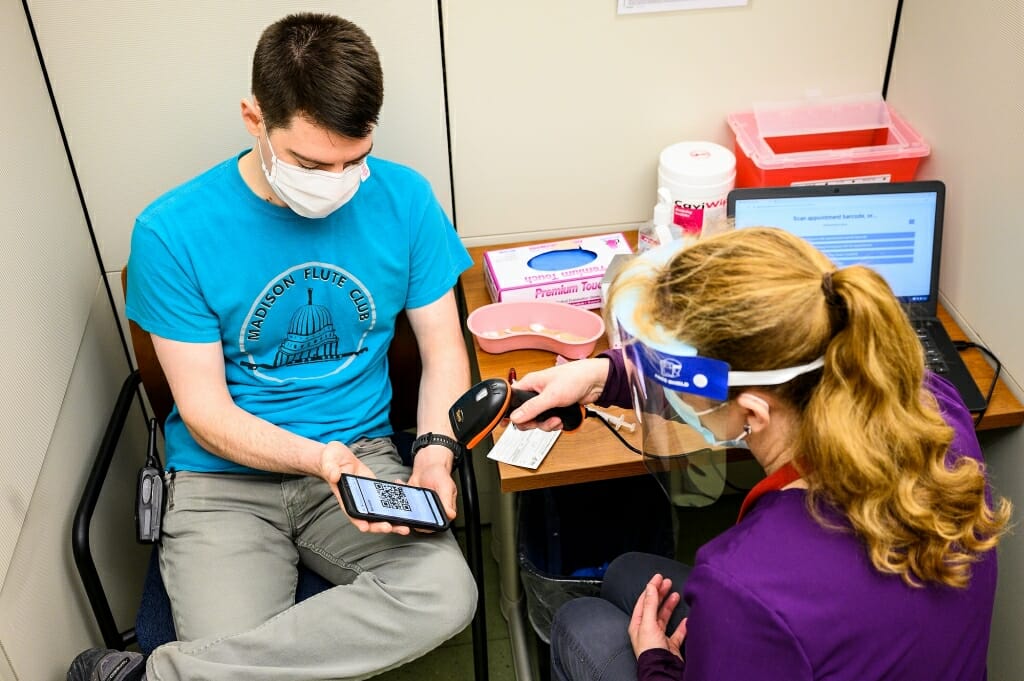
Nurse Nicole Metko, right, scans a QR appointment code before vaccinating Josh Armbruster, a University Housing locksmith working in COVID-19 isolation spaces. Photo: Jeff Miller
Josh Armbruster, locksmith in University Housing
Armbruster was on site at Housing throughout the spring and fall 2020 semesters. He witnessed an ebb and flow of residents arriving and returning to campus in ways unlike any he had ever seen.
“My underlying duties of ensuring the physical security of Housing remained. I found there was a need for extreme flexibility as we transitioned from sending many of our residents home in the beginning of the pandemic all the way through bringing them back in the fall.”
He also found himself in the position of converting residence halls into isolation spaces to support students with COVID-19, delivering fabric samples to engineers and production facilities to make face coverings, and finding unique solutions to lock off common areas to limit gatherings.
“Perhaps the most surreal moment was when I found myself, with very few others, still working on campus when the transition to working from home began. Housing became a ghost town without residents or staff with a real uncertainty of what lay ahead,” he says.
Armbruster was eager to get the vaccine when it became available for employees. “A major concern for me has been the potential of unknowingly spreading the disease and anything that helps prevent that is something I am eager to utilize.”
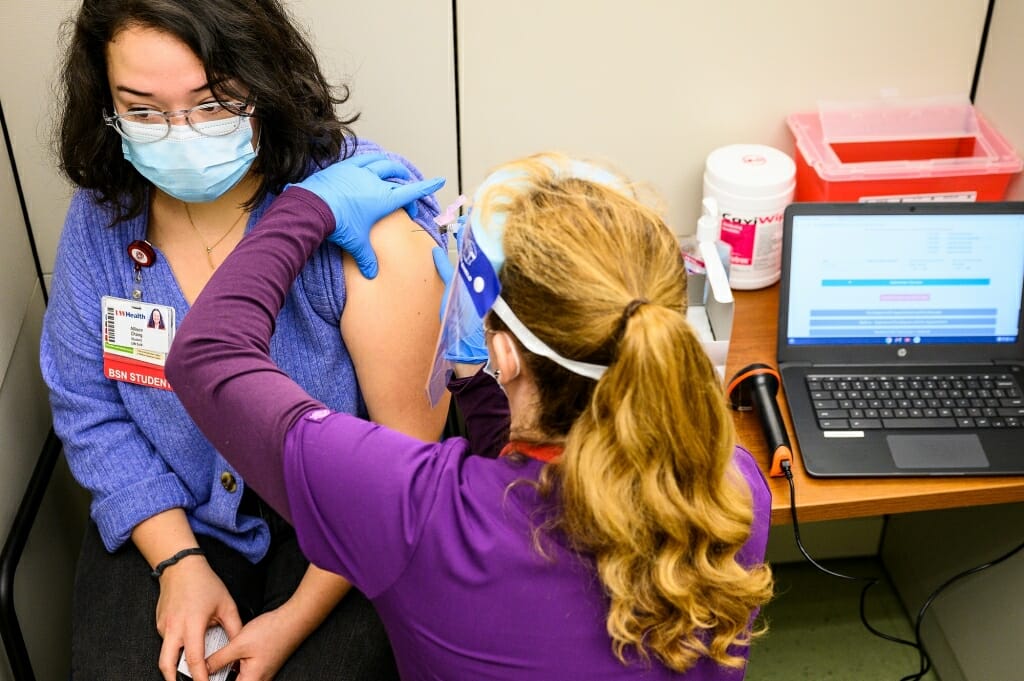
Nurse Nicole Metko, right, vaccinates nursing student Allison Chang with the first of a two-dose shot of the Moderna COVID-19 vaccine. Photo: Jeff Miller
Allison Chang, student in the School of Nursing
During her clinical rotations at the hospital, Chang has become keenly aware of how restrictions on visitors have impacted patients. “As a nursing student, I’ve noticed that patients just want company. A large part of my experience so far has been spending time with patients and keeping them company.”
Hospitals, she says, are balancing teaching with clinical care and student nurses are getting their hands-on experience in smaller, more limited groups and at fewer locations. Her own curriculum has been modified due to the pandemic.
“We are still getting the hands-on experience of setting up IVs and NG (nasogastric) tubes,” she says, but some specialty areas such as labor and delivery, which she hopes to focus on, are limiting the number of people present in those settings.
Chang will graduate from the Accelerated Bachelor of Science of Nursing Program in May and is grateful she was vaccinated prior to starting her final rotation in an ICU unit with mostly COVID-19 patients: “I’m definitely relieved to get the vaccine. It’s a light at the end of the tunnel. Although it doesn’t fix everything right away – people should still take precautions – it’s great to see this step forward.”
Kelly April Tyrrell contributed to this story.

